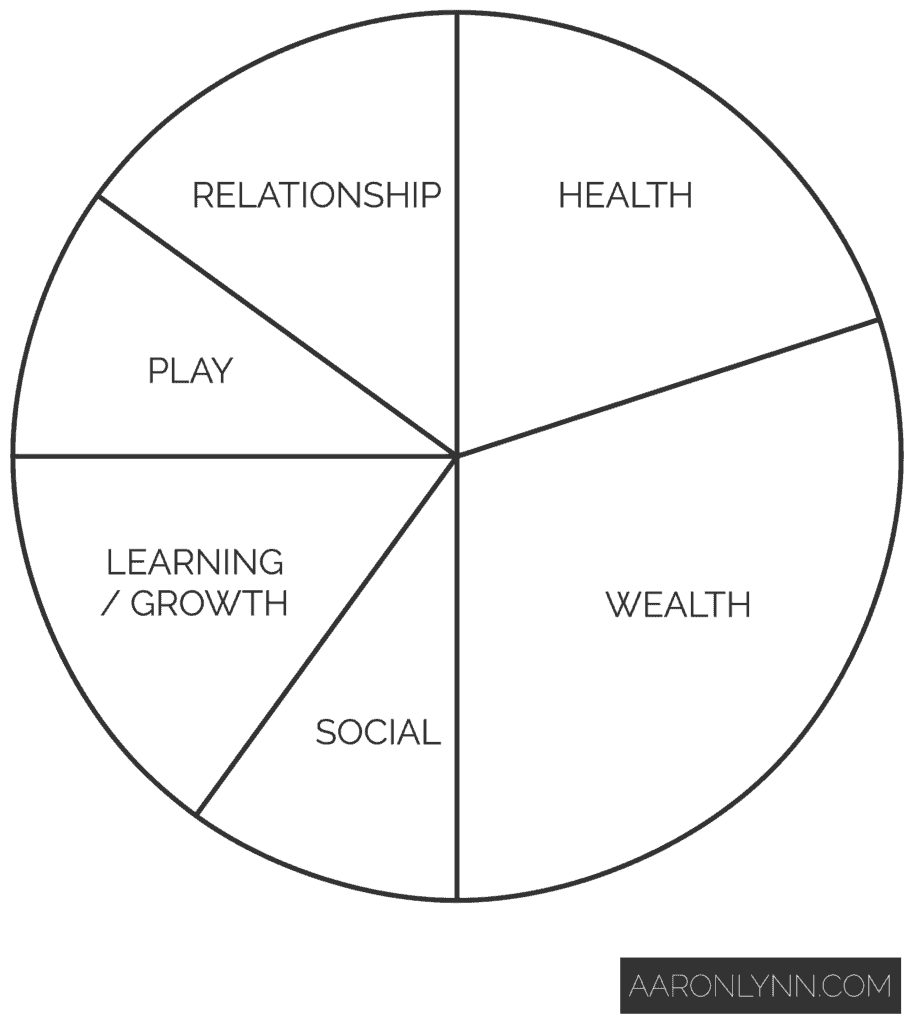
Areas of Life is an important mental model that can help bring clarity to how you go about living your life.
By knowing what your areas of life are, and how much time you put into each area, you will be able to work out if you are balanced (or obsessed) enough in each area.
The Areas of Life Circle
The areas of life can be represented as a circle:
The areas are:
- Wealth.
- Health.
- Learning and Growth.
- Social.
- Dating or Relationship.
- Play.
When represented in visual form, you can see how much time, attention and other resources you put into each area, and are able to see roughly how your life breaks down.
Let’s look at each area in detail.
Your Areas of Life
1. Wealth
Wealth is your ability to make and keep money.
It includes your finances, your money, your investments, your career and your business if you have one.
2. Health
Health is your physical health and the capacity to do the things you want to do.
It includes diet, exercise, longevity and sleep.
3. Learning and Growth
Learning and growth covers the inner game of your life – your mindset and psychology.
It includes any reading you do, any skills you work on developing and any education you choose to undertake.
I also personally include spirituality under Learning and Growth.1I follow no particular religion so reading the Bible or Mahabharata is the same as reading Tony Robbins or Seneca to me.
4. Social
Social is the time and attention you give to acquaintances, friends and family.
For some people, social will be a big part of their lives, especially those with children or large extended families.
For others who are more career-focused, social time can be very minimal.
5. Dating or Relationship
If you are married or have a partner, then this area is the relationship between them and you.
If you are single, then this is the time you spend dating.
When people talk about allocating their time or attention, dating and relationships usually aren’t mentioned.2Whether out of guilt/fear/shame, who knows?
Anyone who has been in a relationship or spent time dating though, will tell you that both can take up a significant amount of time and attention. It is therefore included as an area of life.
6. Play
Play covers any of your recreational or downtime activities. Anything where you are having fun, unwinding or relaxing and where there is no real advancement towards your goals.
Practical Applications of Areas of Life
Let’s get practical with our areas of life.
Now that we know what they are, what exactly can we do with them?
The first thing is to work out how much time, attention, or other resources we allocate into each area, and to create our own circle chart.

By doing this, we can work out if we are allocating enough resources to a given area, or too many resources to a given area.
It is worth noting that not every area of your life needs to be optimised or provided with full resources at a given point in time. For example, I mentioned earlier than someone currently focused on their career, might have minimal social and family time.
The second thing is we now have a neat way to help us sort the various things in our life.
When we have spare time, tasks, goals, or meet new people or need to decide where to place our attention, we can ask:
What area of life does this belong to?
The last thing we can do with our areas of life, is to use the model to manage our obsession or balance levels.
If you currently have a particular goal you are shooting for, you may decide that you need obsession in a given area and that it is OK to put minimal or no time into other areas.
For example, you may be aiming for a certain weight or body fat percentage in your health at the moment, and know that minimising social time and play time is necessary in the short term.3Because eating out with friends makes diets harder to follow, and it’s hard to lift iron and binge on Netflix at the same time.
Once you have achieved your health goal however, you may decide to cut back the gym time and re-introduce dinner with friends and downtime into your schedule.
What To Do Next
Draw out a circle chart of your areas of life.
Then ask yourself:
- Is anything out of proportion?
- Do I need to obsess over or balance anything?
- Is anything taking up waaaaay more of my life than I previously thought?
And from there you can make a rational decision about each area, and if you are spending enough time or resources in that area.
For on how to live a better life, grab your 100% free copy of Evolution below.
- I follow no particular religion so reading the Bible or Mahabharata is the same as reading Tony Robbins or Seneca to me.
- Whether out of guilt/fear/shame, who knows?
- Because eating out with friends makes diets harder to follow, and it’s hard to lift iron and binge on Netflix at the same time.